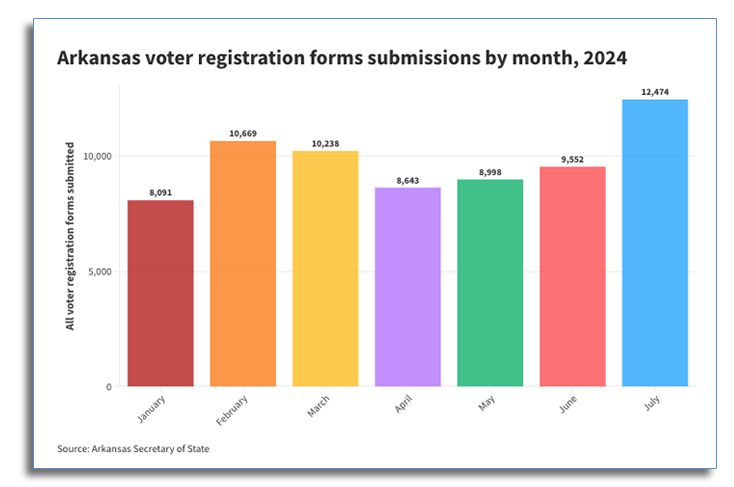How the AR GOP’s latest rule targets marginalized communities and threatens accessible democracy
Last week, the Arkansas Legislative Council (ALC) voted to uphold the State’s emergency rule to ban digital signatures from voter registration forms. It’s an unsurprising move that highlights the persistent efforts by legislators and other state officials to limit voter participation. This is the supermajority’s go-to move: leverage bureaucracy to ensure modern-day voter suppression.
The rule requiring “wet signatures” on voter registration forms, except in specific cases, is part of a broader trend by the AR GOP supermajority to create new — and often illogical — barriers for voters. According to proponents, we must ban digital signatures to provide clarity and uniformity for county clerks. Weird argument considering digitized information is much easier to process than hand-written, “wet” information.
The state’s justification overlooks the reality that this rule disproportionately affects marginalized communities, including those who may find it difficult to physically sign forms due to disability, inaccessibility, or time constraints.
This is not an isolated incident either. Over the years, Arkansas legislators have systematically tightened voter ID laws and attempted to roll back popular pro-democracy measures. Recall ARleg’s attempt to remove the Monday before Election Day as an early voting option. Or consider our state’s laws that make absentee voting more difficult and provisional voting moot because one must physically present identification for their vote to count.
They also consistently voted against good bills that would help clean up, clarify, or streamline confusing voting processes. Each of these actions chips away at the accessibility of the ballot box, making it harder for ordinary Arkansans to exercise their fundamental right to vote.

But why is the GOP supermajority so intent on limiting voter participation? The answer stems from demographics and identity politics.
A recent report showed that our state’s voter registrations dramatically spiked after President Biden’s announcement he would not seek reelection and that he was supporting Vice President Kamala Harris as the Democratic Nominee. The Arkansas Advocate pointed out the jump is an increase of 42% compared to registrations this time last year. We can see why the state’s party in power would feel nervous.
Lower voter turnout indeed favors the party in power, particularly in a state like Arkansas, where the electorate — though currently small — is becoming more diverse. Voting trends also show that new, younger voters lean towards progressive policies. By restricting access to the ballot, the GOP ensures that the electorate remains smaller and more manageable. This preserves their power and political dominance in Arkansas.
But the strategy is a direct assault on democracy. Instead of addressing the underlying issues that lead to low voter turnout, such as lack of civic education, economic disenfranchisement, and the physical barriers to voting, legislators are doubling down on making it even more difficult for people to vote. Their actions are not about preventing voter fraud as they claim, but about maintaining power by suppressing the voices of those who might challenge their rule.
Let that sink in for a minute.
This is a good reminder that Get Loud Arkansas is fighting against the state’s ban on electronic signatures in court. GLA’s fight has never been more timely considering our state’s obsession with undemocratic laws and practices.
As an unabashedly pro-democracy group, we will always advocate for more access to the ballot box. We have fought for voices to be heard regardless of party affiliation or cause. And we support any effort to make registering to vote easier. The right to vote is not just about the ability to cast a ballot but about ensuring that all citizens have an equal opportunity to participate in the democratic process. In Arkansas, as in many other states, this right is under threat, and it is up to us to protect it.





